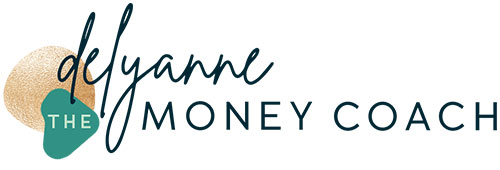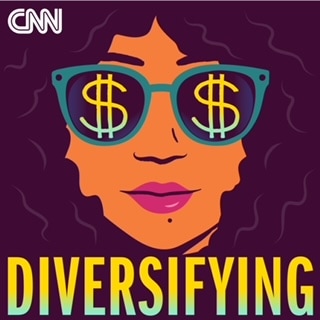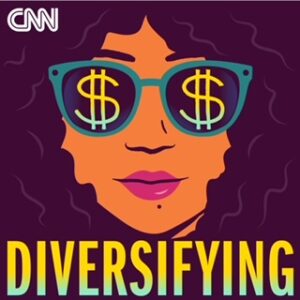In our last episode, we broke down the basics of investing. So now that you’re ready to invest your first dollar, where are you going to put it? What if you could put money in your pocket and stick to your values? This week we dive into the world of ethical investing with Kara Perez, founder of Bravely Go.
If you enjoy Diversifying, CNN would love to hear from you. Please visit https://cnn.com/financepod to take a brief survey.
Episode Transcript
Delyanne Barros
00:00:02
Oh, why should I invest, I might die tomorrow? That’s true, but you might also live until you’re 90 years old. And then what?
Kara Perez
00:00:08
I agree. The stock market is not going to hit zero in 2040, and if it does, we got much bigger issues and no one cares about their portfolio anymore.
Delyanne Barros
00:00:19
Stop me if you’ve heard this one before the world is ending, so why should I bother with saving or investing? I’d rather live for today. It’s something I hear a lot from people who are hesitant to make long term financial plans, but Kara Perez says you should push through those fears. She’s the founder of Bravely Go, a financial education platform that helps women build wealth and use their dollars to express their values. Frankly, the doom and gloom news of the last few years, the last few weeks is enough to make anyone lose motivation.
Kara Perez
00:00:53
Finding ways to be involved always makes me feel more powerful and makes me feel more optimistic and hopeful, because I thrive off of seeing other people taking action as well. When we get stuck in the fear and the anxiety, it isolates us and it makes us feel even worse.
Delyanne Barros
00:01:15
In our last episode, we talked about the basics of investing from 401Ks to index funds. And this week we’re taking it a step further. If you haven’t heard that episode yet, go back and listen. Once you’re ready to invest, how do you align your values with your investments? Is it possible for your dollars to do some good in the world? We’re going to talk it out. I’m Delyanne Barros. Welcome to diversifying.
Delyanne Barros
00:01:41
We’re about to hear how Kara got interested in investing. But first, I want to remind you that I always go over the big takeaways at the end of each episode. Stay tuned for those gems. So back in 2014, Cara Perez was 25 years old and making about $15,000 a year when she had a meltdown in her car. She was on her way to a catering gig when…
Kara Perez
00:02:13
I literally just started crying and was like, “Money is ruining my life!” Like, I just I didn’t have enough of it. I had all this student loan debt. I was not investing. I was not really saving. I had maybe a thousand dollars to my name. I lived with three roommates, and just everything was very, very difficult because I didn’t have any money and what I did have, I didn’t know how to use.
Delyanne Barros
00:02:37
Kara had graduated with over $25,000 in student loans. That day and her car, she decided enough was enough. She cobbled together a bunch of jobs – babysitting, teaching lacrosse, freelance writing – and paid off her final $18,000 in just ten months.
Kara Perez
00:02:55
It was a ton of work. It ended up being just very difficult, and I wouldn’t recommend it, but I am super glad that I at least did something like, I’m glad I didn’t just wallow in what was quickly becoming depression.
Delyanne Barros
00:03:12
Now she runs a six-figure business where she’s her own boss, helping women find power through their finances. She also teaches and practices this nebulous thing called ethical investing.
Kara Perez
00:03:24
Ethical investing is very simply, investing according to the values that you hold near and dear. So right away, you can understand like, “OK, that’s pretty vague.” Yeah, that’s a really vague definition. But right now, ethical investing. There is no one universal definition that all the brokerages and all of the funds and frankly, all of us as investors are adhering to.
Delyanne Barros
00:03:52
Kara lives out her values in a lot of ways… she shops almost exclusively at thrift stores and doesn’t buy meat at all. Once she got into investing, she began to see it as just another way she could express herself. Personally, I think of ethical investing a bit like the quote – unquote natural food trend. The Food and Drug Administration, or the FDA, has a definition of what it considers natural, but it doesn’t regulate who is allowed to use that label on their products. Just like the label natural, any broker can claim a fund as “ethical” and call it a day. Which funds can be called ESG, or environmental, social and governance funds, isn’t regulated by the SCC at all. So make sure you do your research. Also, keep in mind that not everyone shares the same values. So what’s a priority for one person, may not be for another. But ESGs, are a great place for beginners to start. These funds are a way of lining up your values and your money, at least in those three categories.
Kara Perez
00:04:57
There might be a fund that is fossil fuel free, right? No gas, no oil. Social often comes down to gender or like labor rights. So it might be that all the companies included in this fund have a woman on their board of directors. Or it might be that all of the companies in this fund have union labor. And then governance refers to the companies’ governments and not like the US government or the United Kingdom government. So it might be that this company has a board of directors that meets once a year with all of its employees.
Delyanne Barros
00:05:33
So what is something that people should be looking at to make sure that, OK, yes, this aligns with my values?
Kara Perez
00:05:39
What you next want to do is identify the value that you most want to enact in your investments. So if it is like clean water or gender parity, you need to pick one major value for yourself and then go find the funds that are offering that, which the brokerages will tell you, on the Fidelity website. They have their water funds and they have their gender funds. I’ve seen that, so they’re doing that first round of legwork for you. And then you’re going to want to go in, click on the fund and just check out the companies and see if, yeah, my down with these? Cool. And then you can just go ahead and purchase.
Delyanne Barros
00:06:15
There are tons of causes to choose from, and once you decide on a priority, it can still get a little complicated. For example, let’s say you’ve decided not to invest in oil and gas companies.
Kara Perez
00:06:26
A lot of times, if funds are excluding companies like ExxonMobil, then they’re definitely including companies like Nestlé or Amazon, which we know are terrible for other reasons. So, even within the world of ethical investing, you really do have to do your own research and you have to know if and what compromises you are willing to make.
Delyanne Barros
00:06:48
Unfortunately, compromise is a big theme with ethical investing. Probably no ESG fund is going to perfectly represent your values. The alternative to investing in an ESG is buying individual stocks in companies you personally research, but that can be overwhelming for most investors.
Kara Perez
00:07:07
When you look at it from the ethical side, if you go with individual companies, you’re able to control 100 percent the values you invest. But if we come at it from a number side, we do know that funds are generally cheaper, right? And they offer you diversification. And there’s more data on funds’ performance out there for you to use as kind of like, you know, your homework of, do I want to be buying this for any investment? So I do tell people to start with funds. But you should absolutely feel free if you are a confident investor and you already have a nice base of your investments or of your financial life set, to add in individual companies if you want.
Delyanne Barros
00:07:51
So just to clarify funds, do you mean index funds and ETFs?
Kara Perez
00:07:55
Yes, index funds and ETFs. There’s a ton out there. So, for example, there’s one firm Vanguard. Ticker symbol is VUG. That’s like the most popular Vanguard fund. It has excluded fossil fuels, so that’s a fantastic place to start your ethical investing journey because you’ve already got this one value. You know it’s cheap. You know you’re diversified, so you can drop five, 10, 15, 50 grand into that one fund and feel really good about the choices you’re making for the planet, for yourself and for your money. So, yeah, index funds and ETFs, I would say, is a good place to start.
Delyanne Barros
00:08:32
One of the criticisms that I often hear about ethical investing is that these funds underperform, and I don’t know how accurate that statement is. I’ve seen conflicting reports. Some say that’s not true. Some say it is. What’s your take on it? Can you invest ethically and still make money?
Kara Perez
00:08:48
Yes, you absolutely can. So because the definition of ethical investing is so broad, there’s a ton of companies and funds that are included in a lot of these studies that perform terrifically. Like, Coca-Cola is one of these companies that’s often included in gender parity funds because they have a woman on their board of directors. And, so, Coca-Cola performs astonishingly well. You know, like, generally, they are a very well performing company, so they are dragging up the average. But also, Morningstar did a really, really good comprehensive study in 2020 of over 700 ethical funds and found that there’s no meaningful difference between the performance of a non ethical fund and an ethical fund.
Delyanne Barros
00:09:37
So yes, there is evidence that some ESG is perform well. But there’s a lot of variety and greenwashing within the industry. Some have steep fees and underperform the market, so the research aspect of this is crucial. After the break, we’ll talk about how to actually buy an ESG fund.
Delyanne Barros
00:10:04
Welcome back to diversifying. I’m Delyanne Barros, and we’ve been talking to Kara Perez, founder of Bravely Go. So now that you’re ready to buy ethical investments, where do you get one? Basically, the same places you’d buy a stock or an index fund. Brokers like Fidelity and Vanguard offer them, but they tend to have the same few options. If you want to branch out, try searching for ESGs by the particular cause you want to support.
Kara Perez
00:10:33
The first fund that I bought, the ticker symbol is VOTE, V-O-T-E. And specifically, all the companies in that fund objectively suck. But the purpose behind this fund is to claim seats on the board of directors. So if you can have somebody on a board of directors that’s advocating for, you know, like a $20 minimum wage at the company, it’s much more likely you’ll have a $20 minimum wage at the company. So this fund had a fantastic success, I guess in 2018, where they got two seats on the BlackRock board and said, “we need to divest out of fossil fuels.” And so now BlackRock, which is this huge, huge brokerage company they own, everything in the world basically, is beginning to divest out of fossil fuels. And so, I think that’s one of the most powerful investments I own. So even though technically, I own these terrible companies that I disagree with and I don’t shop at, I also am working to make these companies better via my investment. And I think that’s really, like even just talking about it right now, I’m getting amped. I’m like, “Yeah, we can do this. We can change the world.”.
Delyanne Barros
00:11:44
Yeah, I’m getting amped listening to you too. I’m like, “Oh,” I’m already taking notes. And like, I’m going to look all of these up. A good point that you made is everything has a trade off, right?
Kara Perez
00:11:53
I don’t look for perfection at all. I don’t look for perfection in my friends and my partners or in my investments. I look for broad strokes.
Delyanne Barros
00:12:02
Honestly, I find Kara’s perspective so hopeful and practical. No one’s life is perfectly ethical, and no company is either. It’s a lot of pressure to strive for 100%. But there are things you can do that are mostly good for the world. And the most important one is to decide that you want to take action. Because ethical investing is evolving and it can work.
Kara Perez
00:12:27
We talk about the power of our dollar a lot when it comes to the individual side of things, so we can say, you know, every dollar that you pay off in debt is $1 less that you owe. And it’s the same exact thing for companies that you choose to spend your money with or that you do not choose to spend your money with. So for every person that cancels their Amazon Prime account, Amazon as a company, is going to feel that and there’s going to be a ramification. And if everyone who cancels their Amazon Prime account says, “We’re doing this because you’re violating labor rights in the United States,” that is going to push Amazon to do better by its workers. But also, if there is a company or a cause that you do like, by including that and funneling your money towards them, that tells them, “Oh, our mission, our behaviors, these are being rewarded. People want more of this.”.
Delyanne Barros
00:13:21
Yeah, I mean, I don’t want to be super cynical, but I believe that corporations don’t take these kind of actions out of the goodness of their corporate heart, that they do these things because it’s going to translate into dollars for them, whether it’s going to be maintaining customers, acquiring new customers. And so, as consumers, we actually can move corporations to do things, and often that’s not going to happen through other means. So, I completely agree with you and I think that it’s super powerful movement. It’s just very early stages.
Kara Perez
00:13:53
Yes, actually, something I think that’s really important is not only does ethical investing mean different things to different people, but different people have different abilities to ethically invest. So, this year, I am working with my boyfriend, who’s a straight white man, to divest him completely out of fossil fuels. If you are like a queer black woman who has just started investing, or if you come from a marginalized community in some way, I want you to know that I personally and my company don’t hold you to the same ethical investing standards that I’m holding my partner at, right? How you take up space in this world, I think, impacts your ability and your responsibility to invest ethically. So if you’re listening to this and you’re just kind of like, “I can’t do that, I only have a 401K. There are no ethical options, and I don’t have any more money to invest in an IRA.” That’s fine. That’s fine. Go with the options in your 401K. Take care of yourself.
Delyanne Barros
00:14:59
Before we go, I want you to hear from one of our listeners, who I thought framed her worldview so perfectly. Victoria called in to ask about investing ethically, and ended up giving me some perspective during this difficult time.
Victoria (listener voicemail)
00:15:12
Just the basic idea of like, love your neighbor as yourself. I think that’s something that has been instilled in me since I was very, very young. For me personally, just knowing that I have equal value to anyone else around me and that like my successes, you know, shouldn’t be coming at the expense of other people or like other places and environments and things like that. To at least try and to not give up on that journey, I think, is what really counts for me.
Delyanne Barros
00:15:41
Now for this episode’s Money Gems! We know we cover a lot in every episode, so we want to highlight the best tips so you can take action.
Delyanne Barros
00:15:50
Money Gem One: Ethical investing is not only possible, but can be profitable! Don’t let a fear of not seeing profits keep you from putting your money towards your values.
Delyanne Barros
00:16:00
Money Gem Two: ESGs or “Environmental, Social and Governance funds,” are a great way to start supporting causes you care about. They’re offered by most brokers, but make sure to do additional research.
Delyanne Barros
00:16:14
Money Gem Three: Never underestimate the power of your dollar! Taking small steps that do good for the world is a beautiful and effective way to make change.
Delyanne Barros
00:16:25
Next Monday, we’re talking about money and relationships. Our guests have some controversial takes, like talking about money on the first date.
Kiersten Saunders
00:16:37
Money is very much a part of the conversation or the vibe of a first date. Whether you’re signaling how much money you make through your clothes and accessory and car choices, or you actually get explicit and ask the person what they do for a living.
Delyanne Barros
00:16:54
If you’ve got a story you’d like to tell me, or a question you’d like answered, you can give me a call at 202-539-7370. Leave me a voicemail and let me know what you’re thinking.
Delyanne Barros
00:17:06
Diversifying is a production of CNN Audio. Megan Marcus is our executive producer and Haley Thomas is our senior producer. Our producers are Alex Stern, Kinsey Clark and Madeleine Thompson. Our associate producer is Charis Satchell, and our production assistant is Eden Getachew. Eduardo Ocampo is our intern. Mixing and Sound Design by Francisco Monroy. Artwork designed by Brett Burdock. Original Music by Andrew Eappen. Our technical director is Dan Dzula. With support from Chip Grabow, Steve Keil, Anisa Wells, Abbie Fentress Swanson, Tameeka Ballance-Kolasny, Ashley Lusk, Lindsay Abrams, Rafeena Ahmad, Lisa Namerow, and Courtney Coupe. I’m Delyanne Barros. Thanks for listening.
© 2022 Cable News Network. A Warner Bros. Discovery Company. All Rights Reserved. CNN Audio’s transcripts are made available as soon as possible. They are not fully edited for grammar or spelling and may be revised in the future. The audio record represents the final version of CNN Audio.




